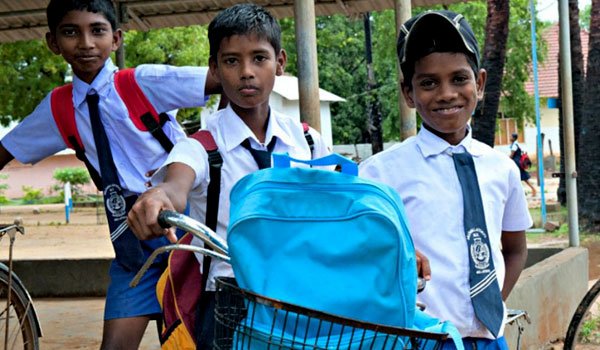It is a mundane action that is, however, remarkable. A new bicycle has transformed this teenager’s educational fortunes for the better, and she is not alone.
Before she received her new bicycle last December, Thiruchcelval faced a daily challenge of the two kilometre one-way journey to school. It meant she did not always attend classes.

Her mother Parameswary explained: “I had to give, or depend on neighbours to loan, my daughter Rs 20 each day for the bus fare to attend the school.”
“Sometimes I was absent from school because I missed the bus,” said Thiruchcelval.
The bus fare is money her family can ill afford. She is one of six children and her father’s ability to earn has been impaired by the loss of an eye and leg during the Sri Lankan conflict.
On time
UNICEF has provided 3,000 bicycles for children living in vulnerable communities in the North and East of Sri Lanka. Too many children in these provinces have been dropping out of school and among the causes of this has been the travel distance, often on poor roads, to schools.
“Now, Thiruchcelval pays more attention to her education. She regularly attends school and is always on time,” said her teacher Ms Baby Senthoran. Her teacher has also found her newly-enthused pupil is able to concentrate better while studying, rather than wondering if she will have enough money to pay for the bus, or might miss her transport home.
In terms of educational achievement, the North is lagging behind the rest of the country. Approximately 12 per cent of children in the North will drop out of school before they complete their primary education. This is almost five times higher than the national average.
Such is the impact of a bicycle that it has not only improved Thiruchcelval’s school attendance. “I take my sister to school on my bicycle every day. We both arrive on time. After school I return home making it easy for me to complete my homework,” she said.
Disruption
Thiruchcelval’s community endured years of disruption during the conflict, which came to an end in 2009. In 1992, the entire population of her village, Tharanikulam, which is situated in an agricultural belt near Vavuniya, was evacuated and many lived in a centre for the displaced for nine years. Now, they are piecing their lives back together.
An assessment of students learning competencies completed in 2011 by UNICEF, found that a displaced child attending a regular school is roughly 1.5 grades behind a typical learner who has not suffered displacement. And a child who is still displaced, or has only recently restarted school, is roughly three grades behind. This situation puts large numbers of children in resettled areas at increased risk of school dropout.
Making sure as many children as possible in vulnerable communities attend school is a priority for UNICEF and its Government partners. Tackling these social disparities and addressing the needs of children and young people is important if there is to be a durable peace and sustainable economic growth in Sri Lanka.
(unicef.org)






